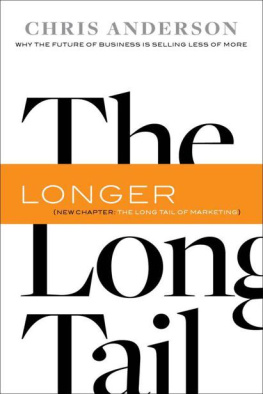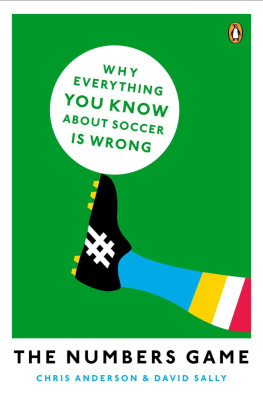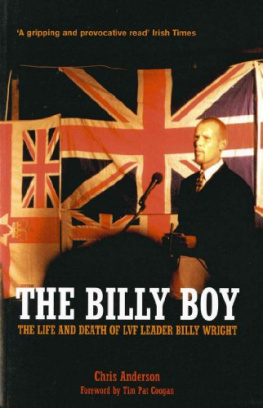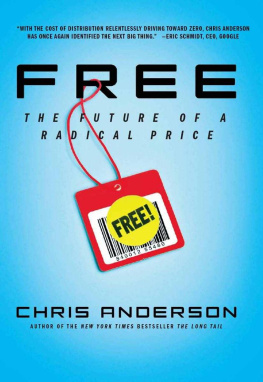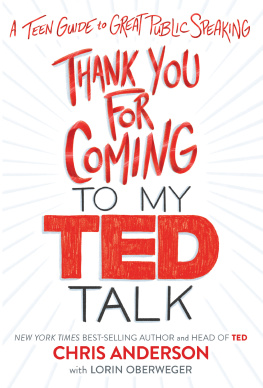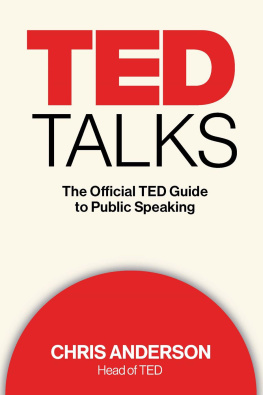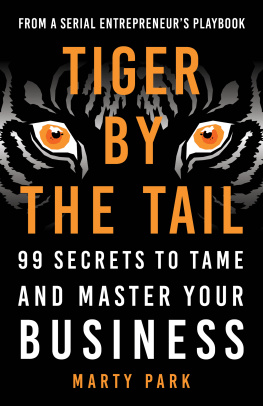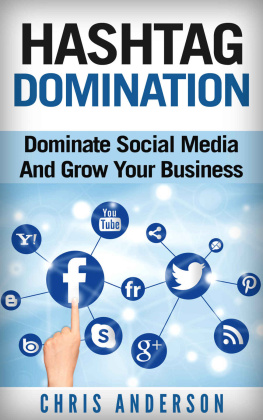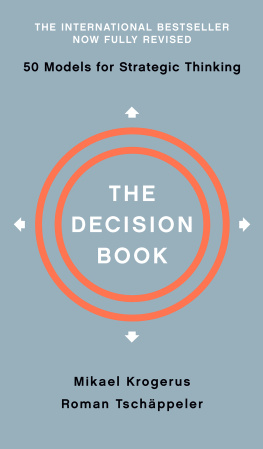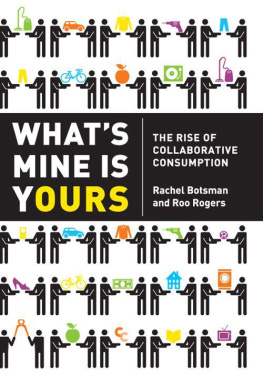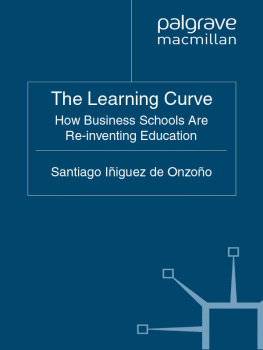LONG TAIL
Why the Future of Business Is Selling Less of More
Enter
CHRIS ANDERSON
To Anne CONTENTS v The Long Tail 15 The Rise and Fall of the Hit 27 A Short History of the Long Tail 41 The Three Forces of the Long Tail 52 The New Producers 58 The New Markets 85 The New Tastemakers 98 Long Tail Economics 125 The Short Head 147 iv | CONTENTS
The Paradise of Choice 168 Niche Culture 177 The Infinite Screen 192 Beyond Entertainment 201 Long Tail Rules 217 The Long Tail of Marketing 225
Cover
This book has benefited from the help and collaboration of literally thousands of people, thanks to the relatively open process of having it start as a widely read article and continue in public as a blog of work in progress. The result is that there are many people to thank, both here and in the chapter notes at the end of the book.
First, the person other than me who worked the hardest, my wife, Anne. No project like this could be done without a strong partner. Anne was all that and more. Her constant support and understanding made this possible, and the price was significant, from all the Sundays taking care of the kids while I worked at Starbucks to the lost evenings, absent vacations, nights out not taken, and other costs of an all-consuming project. But more than that, she was my sounding board, my first reader, my counsel, confidante, and an endless source of encouragement and advice. (Our young childrenDaniel, Erin, Toby, and Isabelalso spent a year without seeing much of their father, and I thank them for rising to the occasion with sterling behavior and, one hopes, no permanent scars.)
In the research and outlining phase of the book, I was fortunate to have had the use of perhaps two of the best working and thinking
vi | ACKNOWLEDGMENTS
spaces on the planet. Louis Rossetto and Jane Metcalfe, our friends, neighbors, and the founders of Wired, graciously lent me their beautiful Berkeley offices for several months in the summer of 2005. (I was a scholar in residence, a title that made me feel smarter all by itself.) And another dear friend, Peter Schwartz, gave me space in the equally beautiful Emeryville offices of his Global Business Network, where I did much of my later-stage brainstorming and whiteboarding with my crack writing assistant, Steven Leckart.
My other invaluable partners were my team at Wired, particularly Bob Cohn and Thomas Goetz, the executive and deputy editors, respectively. They rose to the occasion brilliantly, managing to both encourage me and cover for me as the book consumed more and more of my time. Bob also edited the original Long Tail article, helping me refine the arguments and phrasing, a contribution that continues to pay dividends. Melanie Cornwells comments on the manuscript caught many pop culture errors and otherwise made it smarter. Also thanks to Blaise Zerega, who as managing editor kept the wheels from falling off while I was only semi-present, and Joanna Pearlstein, our research director, who helped with many of the early infographics. And special thanks to Si Newhouse for entrusting me with his remarkable platform for ideas in the first place and generously allowing me to take the time off to expand one into a book.
Many academics contributed in important ways to quantifying Long Tail effects and exploring their implications. Erik Brynjolfsson from MITs Sloan School of Management and Jeffrey Hu from Purdues Krannert School of Management did some of the early work on estimating Amazons Long Tail, which gave me both an analytical framework on which to build the theory and the confidence to know that it could be done. Their continuing research in this area is fascinating, and their support for my work is greatly appreciated. At Harvard Business School, Anita Elberses work on the Long Tail of Netflix and DVDs has been very helpful, and I look forward to both its publication and future work with her.
At Stanford Business School, Professor Haim Mendelson allowed me to present to one of his classes and make the Long Tail a research
ACKNOWLEDGMENTS | vi i
subject. As a result, I was fortunate to work with his students Angie Shelton, Natalie Kim, Saloni Saraiya, and Bethany Poole, who wrote case studies of Yahoo! Music and eBay. On the eBay research we also had the help of Terapeak, which provided invaluable data on the Long Tail of buyers and sellers on that marketplace. And at the University of California, Berkeley, economist Hal Varian has been a font of ideas and advice, along with inspiring me to consider new angles and aspire to greater rigor.
One of the early sources of data and a continuing best-practice Long Tail example was RealNetworks Rhapsody. Rob Glaser and Matt Graves there were a source of constant help and encouragement, for which I am eternally grateful. Reed Hastings, the CEO of Netflix, was not only an early supporter and data provider, but also the one who advised me that my Long Tail phrase might have legs, which turned out to be wise indeed. Dave Goldberg at Yahoo! helped with insight into the music industry, and Bill Fisher of DVDStation provided both data and wisdom into the changing DVD economy. And Robbie VannAdib, formerly of Ecast, deserves a special thanks for getting me started on this.
Thinkers and writers who contributed to this book in both words and ideas include Umair Haque, who helped tremendously with the House Music section; Glenn Fleishman, who contributed hugely to the Amazon sections; Andrew Blau of GBN, who helped me think through the Long Tail from an incentives perspective; Rob Reid, whose long and brilliant emails on the changing entertainment economy Ive quoted at length; and Kevin Laws, whose early insights into the power of a mass of niches influenced the original article.
My agent, John Brockman, not only was a great sounding board and advisor, but also invited me into his extraordinary world of thinkers and scientists, and I count the many dinners and meetings Ive had at his invitation as among some of the most interesting of my life. My editor at Hyperion, Will Schwalbe, helped me tremendously in focusing the book; its current structure is largely due to his wise advice and its completion is due to his constant enthusiasm and gentle guidance.
vi ii | ACKNOWLEDGMENTS
My parents deserve special thanks. To my father, Jim Anderson, for showing me the importance of a global view and intellectual honesty. And to my mother, Carlotta Anderson, for inspiring me with rhetorical rigor and boundless curiosity.
The research on the book industry was among the most difficult, since the ideal source data (Amazons sales records) was unavailable and we were forced to reverse-engineer much of it from third-party data. For that, I owe special thanks to Morris Rosenthal and Tim OReilly. Finally, thanks to John Battelle, the author of The Search, whose example of blogging a book in progress inspired me to start thelongtail.com, which has been the source of incalculable other good ideas, advice, data, and wisdom from my thousands of smart readers, who deserve the last, and heartfelt, thanks.
The tracking of top-seller lists is a national obsession. Our culture is a massive popularity contest. We are consumed by hitsmaking them, choosing them, talking about them, and following their rise and fall. Every weekend is a box-office horse race, and every Thursday night is a Darwinian struggle to find the fittest TV show and let it live to see another week. A few hit songs play in heavy rotation on the radio dials, while entertainment executives in all these industries sweat as they search for the next big thing.
This is the world the blockbuster built. The massive media and entertainment industries grew up over the past half century on the back of box-office rockets, gold records, and double-digit TV ratings. No surprise that hits have become the lens through which we observe our own culture. We define our age by our celebrities and mass-market productsthey are the connective tissue of our common experience. The star-making system that Hollywood began eight decades ago has now spun out into every corner of commerce, from shoes to chefs. Our media is obsessed with whats hot and whats not. Hits, in short, rule.

